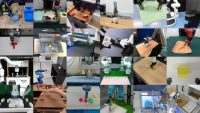DeepMind and Academics Advance General Purpose Robots
October 9, 2023
“Robots are great specialists, but poor generalists,” according to Google DeepMind, which says models are typically trained for individual tasks, and changing a single variable can mean starting again from scratch. Now the London-based Alphabet subsidiary thinks it’s come up with a way to combine knowledge across robotics for a general purpose machine helper. In conjunction with 33 academic labs, Google DeepMind has pooled data from 22 different robot types to create the Open X-Embodiment dataset. Simultaneously, the group releases the RT-1-X robotics transformer (RT) model derived from RT-1.
AI News calls the Open X-Embodiment “a monumental effort,” and says the dataset “comprises over 500 skills, encompassing a staggering 150,000 tasks across more than a million episodes.” In all, “a significant leap towards training a universal robotic model capable of multifaceted tasks.”

“Training a single model on data from multiple embodiments leads to significantly better performance across many robots than those trained on data from individual embodiments,” according to a blog post by Google DeepMind, whose findings are amplified in the research paper “Open X-Embodiment: Robotic Learning Datasets and RT-X Models.”
The RT-1-X model was tested “in five different research labs, demonstrating 50 percent success rate improvement on average across five different commonly used robots compared to methods developed independently and specifically for each robot,” the company explains, adding that it “also showed that training our visual language action model, RT-2, on data from multiple embodiments tripled its performance on real-world robotic skills.”
TechCrunch calls the efforts of Google DeepMind and the academic collective a “bid to create an ImageNet of robot actions.” Just as ImageNet advanced computer vision by training large-scale object recognition models, the Google team believes “Open X-Embodiment can do the same to advance robotics.”
“Robot learning” is a challenge undertaken by many robotics research labs. “Solutions run a fairly wide gamut at the moment,” writes TechCrunch, adding that it has become clear that “building more complex and capable systems will almost certainly involve a combination of solutions,” but central to most will be “a large, shared dataset.”
Companies including Viam and Intrinsic are working to ease the barrier to entry for robot programming.
General purpose robots are being eyed for potential use in education, healthcare, manufacturing and retail. The future of robotics, suggests AI News, is in “mutual learning, where robots teach each other, and researchers learn from one another.”

No Comments Yet
You can be the first to comment!
Leave a comment
You must be logged in to post a comment.